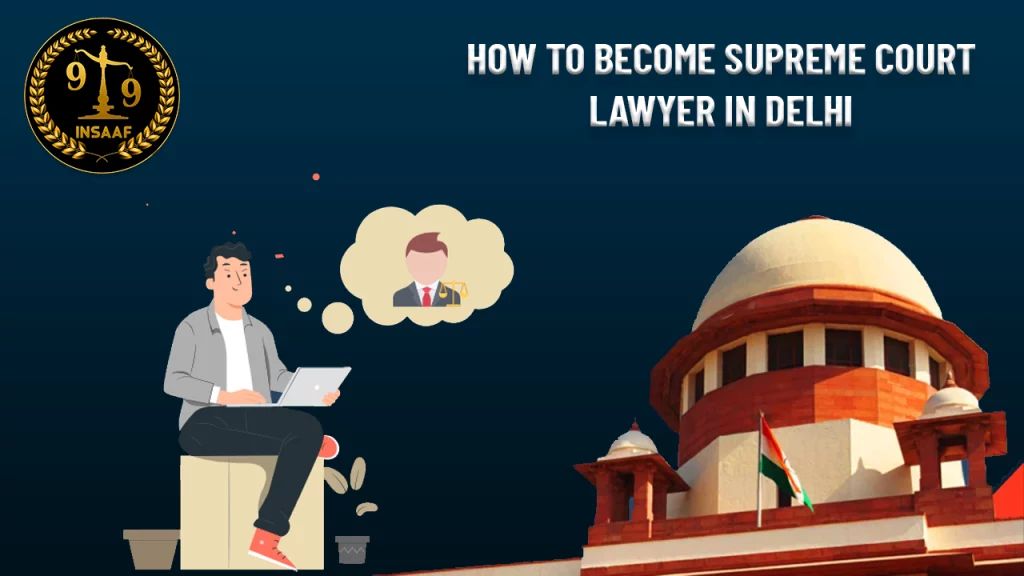

Online Legal Advice from Insaaf99® Online Lawyer Consultation in India


Online Legal Advice from Insaaf99® Online Lawyer Consultation in India

Welcome to our blog on how to become a Supreme Court lawyer in Delhi!
The Supreme Court of India is the highest judicial body in our country and holds immense power in interpreting and upholding the Constitution. Aspiring to become a Supreme Court lawyer is a commendable goal. However, it requires dedication, perseverance and a deep understanding of the legal system.
In this blog, we will guide you through the essential steps and skills necessary to embark on this prestigious and intellectually challenging career path.
A Supreme Court lawyer is an attorney who practices law and represents clients before the Supreme Court of a country. In the case of India, a Supreme Court lawyer is someone who advocates cases before the Supreme Court of India, the highest judicial authority in our country.
The role of a Supreme Court lawyer is crucial as they are responsible for presenting arguments, interpreting laws and seeking justice on behalf of their clients. They handle cases that have far-reaching consequences and often involve complex online legal advice and constitutional matters. Supreme Court lawyers play a pivotal role in shaping the legal landscape and upholding the principles of justice, fairness and the rule of law.
Becoming a Supreme Court lawyer requires years of hard work, dedication and a passion for justice. It is a career path that demands continuous learning, honing legal skills, and building a reputation in the legal fraternity. While the journey is challenging, the rewards are immense, as Supreme Court lawyers have the opportunity to contribute to the development of jurisprudence and protect fundamental rights and freedoms.

To become a Supreme Court lawyer in India, individuals must possess a law degree and fulfill certain eligibility criteria. They need to enroll with the Bar Council of India and gain experience by practicing law in lower courts.
To become a Supreme Court lawyer in Delhi, India, you need to follow a systematic and rigorous process. The general outline of the process involved in becoming a Supreme Court lawyer is:
The first step for anyone who aspires to become a lawyer in Supreme Court of India is to pass class 12th with minimum 50%. This is required for most of the law colleges across India.
After class 12th, you need to enroll in a law college and obtain a law degree. You can either complete a five-year integrated law program (B.A.LL.B./B.Com.LL.B./B.Sc.LL.B.) after high school or a three-year law program (LLB) after completing a bachelor's degree. It is beneficial to pursue your law degree from a recognized law school or university approved by the Bar Council of India.
After obtaining your law degree, you must enroll with the Bar Council of Delhi. Submit the required documents, including your law degree, identification proofs, and enrollment fees, to register as an advocate with the Bar Council. As per the Indian Advocate Act (1961), you need to get the certificate from Bar Council of India in order to practice in the court.
To become a Supreme Court lawyer, it is essential to gain practical experience by practicing law. Become a Junior Assistant and start by working with senior advocates or law firms in lower courts to understand the legal procedures, research skills, and courtroom practices.
The Bar Council of India conducts the All India Bar Examination, which is a mandatory exam for practicing law in India. Clearing this exam is a prerequisite for appearing before the Supreme Court. Prepare well for the AIBE and fulfill the requirements to pass the examination.
Focus on developing expertise in specific areas of law, such as constitutional law, civil law, criminal law, or corporate law. Gain in-depth knowledge and experience in these areas to enhance your credibility and increase your chances of handling Supreme Court cases.
Familiarize yourself with the workings of the Supreme Court by attending court proceedings, observing cases, and understanding the legal arguments presented. This will give you valuable insights into the practices and expectations of the court.
The Advocate on Record (AOR) Exam is conducted by the Supreme Court of India for advocates who aspire to practice in Supreme Court of India. After clearing this exam, the Supreme Court of India registers you as an Advocate on Record Member in the Supreme Court BAR Association. You can now practice in the Supreme Court of India.
The journey to becoming a successful Supreme Court lawyer doesn't end with admission to the court. It requires continuous learning, staying updated with legal developments, and honing your advocacy skills. Attend legal seminars, participate in training programs and engage in professional development activities to enhance your knowledge and expertise.
How to Become a Supreme Court Lawyer in Delhi is a long-term goal that demands both passion and unwavering commitment to the pursuit of justice. It requires not only legal knowledge but also the ability to think critically, analyze complex issues, and present persuasive arguments.
By following the steps outlined in this blog, you can lay a strong foundation for your career and work towards achieving your goal. Remember, success in this field is not immediate, but with determination, continuous learning, and the right opportunities, you can make a meaningful impact and contribute to the administration of justice at the highest level.
So, embrace the challenges, stay dedicated, and let your legal prowess shine as you strive to become a Supreme Court lawyer in Delhi.
Also Read